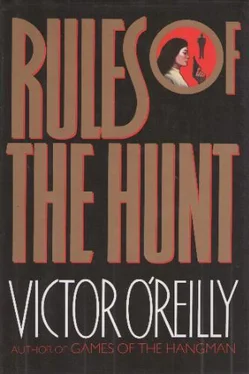Victor O'Reilly - Rules of The Hunt
Здесь есть возможность читать онлайн «Victor O'Reilly - Rules of The Hunt» весь текст электронной книги совершенно бесплатно (целиком полную версию без сокращений). В некоторых случаях можно слушать аудио, скачать через торрент в формате fb2 и присутствует краткое содержание. Жанр: Триллер, на английском языке. Описание произведения, (предисловие) а так же отзывы посетителей доступны на портале библиотеки ЛибКат.
- Название:Rules of The Hunt
- Автор:
- Жанр:
- Год:неизвестен
- ISBN:нет данных
- Рейтинг книги:4 / 5. Голосов: 1
-
Избранное:Добавить в избранное
- Отзывы:
-
Ваша оценка:
- 80
- 1
- 2
- 3
- 4
- 5
Rules of The Hunt: краткое содержание, описание и аннотация
Предлагаем к чтению аннотацию, описание, краткое содержание или предисловие (зависит от того, что написал сам автор книги «Rules of The Hunt»). Если вы не нашли необходимую информацию о книге — напишите в комментариях, мы постараемся отыскать её.
Rules of The Hunt — читать онлайн бесплатно полную книгу (весь текст) целиком
Ниже представлен текст книги, разбитый по страницам. Система сохранения места последней прочитанной страницы, позволяет с удобством читать онлайн бесплатно книгу «Rules of The Hunt», без необходимости каждый раз заново искать на чём Вы остановились. Поставьте закладку, и сможете в любой момент перейти на страницу, на которой закончили чтение.
Интервал:
Закладка:
It was not yet seven in the morning, but the train was jammed with work-bound sararimen – male salaried employees in their uniforms of blue or gray business suits, white shirts, and conservative ties. Squeezed in between them were OLs – office ladies – the catchall title given to women office workers. Some OLs might have university degrees and other excellent qualifications, but even so, the serious work belonged to the men. An OL's job was to make the tea and dot he chores and bow prettily and get married. An OL was a second-class citizen.
Adachi thought of himself as moderately progressive, but he admitted to himself that he had more or less accepted the status quo until he had met Chifune. Now he found himself looking at OLs and other Japanese women with renewed interest. If Chifune was representative of the true nature of Japanese womanhood, Japan was in for some interesting times.
He slipped his folded copy of the Asahi Shibumi out of his pocket and scanned the news. There was another bribery scandal in the Diet, the Japanese Parliament, and the Americans were getting upset about the trade balance.
Nothing ever changed. He refolded the paper with some skill – it was an art form like origami to do such a thing in a subway car during rush hour, but you got good with practice – and checked the stock market. Nothing had changed there, either. The Nikkei was still going up. Day after day, that was all it did. Half of Japan seemed to be buying shares. Property values were going insane. Adachi was glad he had been a paratrooper. There was nothing like jumping out of a perfectly good aircraft to remind you that what goes up must come down. He invested, but cautiously.
The train swayed and Adachi looked up. Several feet away, a young and rather pretty OL was looking his way, an expression of subdued distress on her face. Then she looked directly at him, a silent cry for help in her eyes. The carriage was jammed. Pressed up directly behind her was a round-faced middle-aged sarariman, his face expressionless.
The practice was all too common. A man would press up against a woman in a crowded subway and grope her or otherwise excite himself sexually, confident that the woman would not complain. A Western woman would tear herself away from her assailant or otherwise protest. Japanese women were taught to be submissive. Other travelers, packed together but isolated in their own worlds, would not interfere.
Adachi sighed. Chifune would be the death of him. He squeezed toward the beleaguered OL until he stood beside her, then smiled at the sarariman. The man smiled back uncertainly. Adachi reached out and put his hand in a friendly manner on his shoulder and squeezed. He thought he had the place about right. The sarariman 's face glazed over with pain and he went very white, and at the next station shot from the train as if rocket-propelled.
The girl looked at Adachi uncertainly. He had helped her, but this was not usual behavior. She was not sure what was coming next. Adachi winked at her and she blushed. He could not think of what else to do, and then he remembered that he had a bunch of these idiotic MPD public relation cards in his pocket. The cards featured the MPD mascot, a mouse called ‘Peopo,’ and promoted the emergency service 110 number and the name, rank, and telephone number of the officer concerned. It was the kind of thing you gave to a citizen and not to a yakuza, if you did not want to be laughed at. The girl looked reassured and gave a little bow of thanks. Adachi's station came up and he smiled briefly and left.
Adachi's team worked in a large open office on the sixth floor.
The layout was designed so that everybody could see what everybody else was doing. It was not ideal for concentrated individual work, but it was excellent for supervising and integrating the group.
There were thirty detectives, including the superintendent himself, in Adachi's department. The layout in this case consisted of three islands of eight detectives headed by a sergeant – with the remaining three desks by the windows occupied by two inspectors and Adachi himself, when he was not using his private office. Down the corridor were individual interview rooms, and anybody who needed privacy or to concentrate went there for the period necessary.
However, being apart from the group for long was frowned on. The group system, the basis of Japanese social culture, had served them well. The most frequently heard saying in Japan was “The nail that protrudes gets hammered down.” The system did encourage individual initiative, but only in the sense that it contributed to the progress of the group.
Personally, Adachi was surprised how many nails were protruding these days, but thought it had probably always been so in reality. The trick was to avoid the hammer, and the best way to do that was not to be perceived as a nail. Alternatively, the nails could come together as a group. One way or another in Japan, it was hard to avoid the group.
Most of the desks were occupied when Adachi walked in. His detectives were hand-picked, and selection for the elite unit was regarded as a privilege, but the level of commitment demanded was high. Typically his detectives worked seventy to eighty hours a week on top of commuting up to three hours a day and attending the near-obligatory group drinking sessions after work.
Quite a number of his men were unshaven and bleary-eyed from having been up all night. The killing of the kuromaku was a serious business, and its resolution demanded every effort. Also, it was well understood that the twenty-four hours after a murder were a particularly crucial time. Physical evidence quickly got lost. Human memory had a short shelf life. You had to search and interview as quickly as possible. That was the well-understood routine.
Adachi felt a pang of guilt for not having been up all night with his men as well, but then reflected that in his own way he had been making a contribution to the inquiry. Anyway, his right-hand man, Detective Inspector Jim Fujiwara, was about as reliable as another human being could be. They had worked together for the last three years and knew each other well. Fujiwara, a stocky powerful man in his late forties, had worked his way up through the ranks. He had more street experience than Adachi and an encyclopedic knowledge of the yakuza. Their respective skills were complimentary and they worked together well. Adachi felt fortunate.
Adachi sat down at his desk and Fujiwara sat down facing him. A detective brought tea. He was wearing house slippers. Most of the detectives were. In Japan, workers spent so much time in their offices that it was customary to make yourself comfortable and as much at home as you could. And, of course, no one wore shoes inside the home. They were removed as you entered and placed by the door. It was a barbaric idea to bring dirt from the street into the home, and, anyway, outside shoes were not comfortable to relax in.
There was a pile of reports on Adachi's desk. It stretched several inches high. He might have sneaked in a little relaxation last night, but such interludes would be scarce until Hodama's killers were found. There would be work, work, and more work. It was the Japanese way.
Adachi gestured at the reports. "Fujiwara- san, I see you have been busy."
Fujiwara acknowledged the implied compliment. Specific praise was uncommon. You were expected to do your work as well as you could and you did it. Nothing else would be appropriate. There was nothing exceptional about doing your duty.
"We have completed the house-to-house questioning and we have in all the reports from the kobans and mobiles in the area. In addition, we have the preliminary pathology reports and those of the Criminal Investigation Laboratory. There have been some developments."
Читать дальшеИнтервал:
Закладка:
Похожие книги на «Rules of The Hunt»
Представляем Вашему вниманию похожие книги на «Rules of The Hunt» списком для выбора. Мы отобрали схожую по названию и смыслу литературу в надежде предоставить читателям больше вариантов отыскать новые, интересные, ещё непрочитанные произведения.
Обсуждение, отзывы о книге «Rules of The Hunt» и просто собственные мнения читателей. Оставьте ваши комментарии, напишите, что Вы думаете о произведении, его смысле или главных героях. Укажите что конкретно понравилось, а что нет, и почему Вы так считаете.




![Беар Гриллс - The Hunt [=The Devil's Sanctuary]](/books/428447/bear-grills-the-hunt-the-devil-s-sanctuary-thumb.webp)







